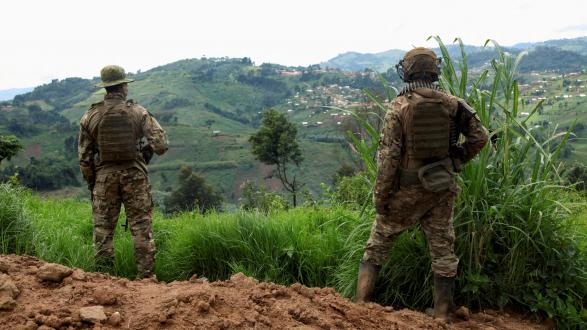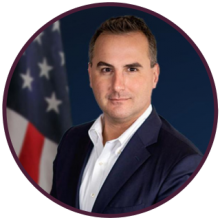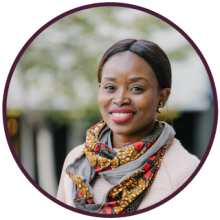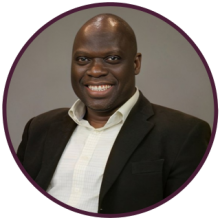Online Webinar
Hear from Tyler Beckelman, Former Deputy Assistant Administrator, Bureau for Africa, USAID, Ebenezer Obadare, Douglas Dillon Senior Fellow for African Studies at the Council on Foreign Relations (CFR), and Ornella Nsoki, DRC Program Manager at PAEMA (Preventing and Ending Mass Atrocities), on July 25 at 8 am PT, for a dialogue addressing the longstanding tensions between Rwanda and the Democratic Republic of the Congo (DRC). The conversation will discuss the recent seizure of Goma—a Congolese city known for its mining industry—by rebel group M23 and how the continued global demand for critical minerals perpetuates illicit trade and violence in the region.
Why It's Important:
- In January, M23 rebels seized control of Goma in eastern Democratic Republic of the Congo, as part of an effort to claim territory since the late 1990s.
- An estimated 150 metric tons of coltan, a metallic ore used in electronics, were smuggled into Rwanda by rebels in 2024. Coltan mining has been associated with issues of human security, including damage to the environment and the exploitation of laborers, including children.
- Over one million Congolese are currently displaced as a result of M23 activity, with over a hundred thousand living in encampments outside of Goma.
- Following the Rwandan genocide in 1994, tensions between Tutsi and Hutu militia groups continue to shape the political relationship between Rwanda and the DRC.
Please feel free to send in questions in advance to events@pacificcouncil.org.
To register for this webinar, visit the Zoom registration page.
Guest Speaker
Tyler Beckelman ia the Former Deputy Assistant Administrator for USAID’s Bureau for Africa, where he brought over 18 years of experience in African affairs and programming in development, humanitarian and transitional contexts.
Prior to joining USAID, Mr. Beckelman served as the Director of International Partnerships at the U.S. Institute of Peace, where he oversaw the institute’s efforts to deepen substantive partnerships with multilateral institutions, governments and private foundations, and led research initiatives focused on the future of the multilateral system and international engagement in fragile states. From 2012-13, Mr. Beckelman served on the National Security Council as Director for African Affairs, where he coordinated U.S. policy for 15 countries in East and Southern Africa, advised senior administration officials, helped develop the Obama administration’s signature policy initiatives, and supported President Obama’s trips to South Africa and Tanzania.
Following his service at the NSC, Mr. Beckelman was the Director of USAID/Somalia Field Office based in Nairobi, Kenya and Mogadishu, Somalia, where he oversaw the rapid expansion of U.S. support for Somalia’s nascent political transition and led USAID’s engagement with the Federal Government of Somalia and international partners. He has also served as a Senior Advisor and Africa Division Chief in USAID’s Bureau for Resilience and Food Security, Regional Advisor for East Africa in USAID’s Bureau for Africa, and managed stabilization and political transition programs in Africa and the Middle East for USAID's Office of Transition Initiatives. Mr.
Beckelman began his career overseeing USAID humanitarian programs in Sudan, South Sudan, and Zimbabwe for USAID’s Office of Food for Peace, and at the Organization for Economic Cooperation and Development in Paris.
Mr. Beckelman earned his B.A. in Political Science, International Studies, and Economics from Macalester College, and a M.A. in Government (Conflict Resolution) from Georgetown University.
Guest Speaker
Ornella Nsoki is currently the DRC Program Manager at PAEMA (Preventing and Ending Mass Atrocities), a US-based NGO, and formerly a Social Protection Specialist at the World Bank in Kinshasa. She brings over a decade of experience at the intersection of community development, social policy, and advocacy in fragile and conflict-affected settings.
At PAEMA, she leads the organization’s inaugural DRC Advocacy Cohort, supporting Congolese civil society actors to shape policy dialogue and engage with US-based stakeholders on peacebuilding, governance, and human rights. Her work focuses on strengthening local advocacy capacity and uplifting grassroots voices in high-level forums.
From 2019 to 2022, Ornella served as a Social Protection Specialist with the World Bank, overseeing operations in the DRC’s eastern provinces. She managed projects designed to address vulnerability and displacement in FCV contexts, contributing to the design and implementation of large-scale interventions in social assistance and community resilience. Prior to joining the World Bank’s Social Protection team, from 2014 to 2018, she served as a community development consultant, where she designed and implemented small-scale initiatives, led community stakeholder engagements, and managed a youth-oriented organization focused on civic education, girls’ empowerment, and integrating ICT into education. During this period, she also led an ICT accountability pilot for the World Bank, which has since evolved into a nationwide feedback and grievance mechanism now used for reporting sexual exploitation and abuse/sexual harassment incidents in the DRC's $800 million World Bank-funded flagship free education initiative.
Ornella holds a Master’s degree in Education Policies for Developing Countries from the University of Bamberg in Germany. Her expertise bridges grassroots practice and multilateral policy work, offering a grounded perspective on how local communities experience and respond to regional tensions and development challenges.
Guest Speaker & Moderator
Ebenezer Obadare is Douglas Dillon senior fellow for Africa studies at the Council on Foreign Relations (CFR). Before joining CFR, he was professor of sociology at the University of Kansas, Lawrence. He is also a senior fellow at the New York University School of Professional Studies Center for Global Affairs, as well as a fellow at the University of South Africa’s Institute of Theology. Author of numerous works on civil society and the state, and religion and politics in Africa, his most recent book, published by the University of Notre Dame Press, is titled Pastoral Power, Clerical State: Pentecostalism, Gender, and Sexuality in Nigeria. His next book, The Nigerian Century, an analysis of how a nation in the throes of social anomie can be made whole again, will be published by Oxford University Press.
Obadare was Ralf Dahrendorf Scholar and Ford Foundation International Scholar at the London School of Economics and Political Science where he completed his PhD in social policy in 2005. He holds a BA in history and an MSc in international relations from the Obafemi Awolowo University, Ile-Ife, Nigeria.
Obadare was a political reporter for The News and TEMPO magazines from 1993 to 1995, and a lecturer in international relations at the Obafemi Awolowo University from 1995 to 2001. His primary areas of interest are civil society and the state, and religion and politics in Africa.
He is the author and editor of numerous books, including Christianity, Sexuality and Citizenship in Africa (2019), Pentecostal Republic: Religion and the Struggle for State Power in Nigeria (2018), Governance and the Crisis of Rule in Contemporary Africa: Leadership in Transformation (2016), Humor, Silence, and Civil Society in Nigeria (2016), The Handbook of Civil Society in Africa (2014), Civic Agency in Africa: Arts of Resistance in the 21st Century (2014), Democracy and Prebendalism in Nigeria: Critical Interpretations (2013), and Nigeria at Fifty: The Nation in Narration (2011).
Obadare’s essays have appeared in the leading Africanist and disciplinary journals, including the Review of African Political Economy (ROAPE), African Affairs, Politique Africaine, Journal of Civil Society, Democratization, Patterns of Prejudice, Africa Development, Africa, Critical African Studies, Development in Practice, Journal of Modern African Studies, Journal of Contemporary African Studies, Interkulturelle Theologie, and Journal of Church and State.
He has written for Foreign Affairs, The Wall Street Journal, The New York Times, The National Interest, Foreign Policy, The Globe and Mail, and other prestigious outlets.
He is the editor of Journal of Modern African Studies and contributing editor of Current History.
To register for this webinar, visit the Zoom registration page.







